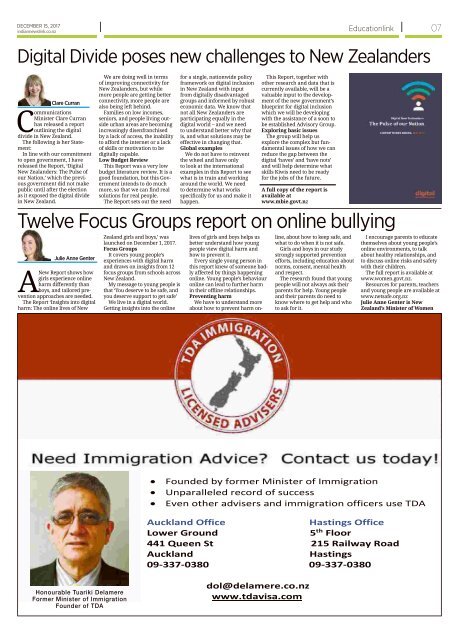You also want an ePaper? Increase the reach of your titles
YUMPU automatically turns print PDFs into web optimized ePapers that Google loves.
DECEMBER <strong>15</strong>, <strong>2017</strong><br />
Educationlink<br />
07<br />
<strong>Digital</strong> Divide poses new challenges to New Zealanders<br />
Clare Curran<br />
Communications<br />
Minister Clare Curran<br />
has released a report<br />
outlining the digital<br />
divide in New Zealand.<br />
The following is her Statement:<br />
In line with our commitment<br />
to open government, I have<br />
released the Report, ‘<strong>Digital</strong><br />
New Zealanders: The Pulse of<br />
our Nation,’ which the previous<br />
government did not make<br />
public until after the election<br />
as it exposed the digital divide<br />
in New Zealand.<br />
Twelve Focus Groups report on online bullying<br />
Julie Anne Genter<br />
ANew Report shows how<br />
girls experience online<br />
harm differently than<br />
boys, and tailored prevention<br />
approaches are needed.<br />
The Report ‘Insights into digital<br />
harm: The online lives of New<br />
We are doing well in terms<br />
of improving connectivity for<br />
New Zealanders, but while<br />
more people are getting better<br />
connectivity, more people are<br />
also being left behind.<br />
Families on low incomes,<br />
seniors, and people living outside<br />
urban areas are becoming<br />
increasingly disenfranchised<br />
by a lack of access, the inability<br />
to afford the internet or a lack<br />
of skills or motivation to be<br />
digitally capable.<br />
Low Budget Review<br />
This Report was a very low<br />
budget literature review. It is a<br />
good foundation, but this Government<br />
intends to do much<br />
more, so that we can find real<br />
solutions for real people.<br />
The Report sets out the need<br />
Zealand girls and boys,’ was<br />
launched on <strong>December</strong> 1, <strong>2017</strong>.<br />
Focus Groups<br />
It covers young people’s<br />
experiences with digital harm<br />
and draws on insights from 12<br />
focus groups from schools across<br />
New Zealand.<br />
My message to young people is<br />
that ‘You deserve to be safe, and<br />
you deserve support to get safe’<br />
We live in a digital world.<br />
Getting insights into the online<br />
for a single, nationwide policy<br />
framework on digital inclusion<br />
in New Zealand with input<br />
from digitally disadvantaged<br />
groups and informed by robust<br />
economic data. We know that<br />
not all New Zealanders are<br />
participating equally in the<br />
digital world – and we need<br />
to understand better why that<br />
is, and what solutions may be<br />
effective in changing that.<br />
Global examples<br />
We do not have to reinvent<br />
the wheel and have only<br />
to look at the international<br />
examples in this Report to see<br />
what is in train and working<br />
around the world. We need<br />
to determine what works<br />
specifically for us and make it<br />
happen.<br />
This Report, together with<br />
other research and data that is<br />
currently available, will be a<br />
valuable input to the development<br />
of the new government’s<br />
blueprint for digital inclusion<br />
which we will be developing<br />
with the assistance of a soon to<br />
be established Advisory Group.<br />
Exploring basic issues<br />
The group will help us<br />
explore the complex but fundamental<br />
issues of how we can<br />
reduce the gap between the<br />
digital ‘haves’ and ‘have nots’<br />
and will help determine what<br />
skills Kiwis need to be ready<br />
for the jobs of the future.<br />
A full copy of the report is<br />
available at<br />
www.mbie.govt.nz<br />
lives of girls and boys helps us<br />
better understand how young<br />
people view digital harm and<br />
how to prevent it.<br />
Every single young person in<br />
this report knew of someone badly<br />
affected by things happening<br />
online. Young people’s behaviour<br />
online can lead to further harm<br />
in their offline relationships.<br />
Preventing harm<br />
We have to understand more<br />
about how to prevent harm online,<br />
about how to keep safe, and<br />
what to do when it is not safe.<br />
Girls and boys in our study<br />
strongly supported prevention<br />
efforts, including education about<br />
norms, consent, mental health<br />
and respect.<br />
The research found that young<br />
people will not always ask their<br />
parents for help. Young people<br />
and their parents do need to<br />
know where to get help and who<br />
to ask for it.<br />
I encourage parents to educate<br />
themselves about young people’s<br />
online environments, to talk<br />
about healthy relationships, and<br />
to discuss online risks and safety<br />
with their children.<br />
The full report is available at<br />
www.women.govt.nz.<br />
Resources for parents, teachers<br />
and young people are available at<br />
www.netsafe.org.nz<br />
Julie Anne Genter is New<br />
Zealand’s Minister of Women<br />
• Foundedbyformer Minister ofImmigration<br />
• Unparalleled recordofsuccess<br />
• Evenotheradvisers andimmigrationofficersuse TDA<br />
Honourable TuarikiDelamere<br />
FormerMinisterofImmigration<br />
FounderofTDA<br />
Honourable Tua ri ki Delamere<br />
Fo rm er M inister o fImm i gration<br />
Founder of TDA<br />
Auckland Office<br />
HastingsOffice<br />
LowerGround<br />
5 th Floor<br />
441QueenSt<br />
2<strong>15</strong> Railway Road<br />
Auckland<br />
Hastings<br />
09-337-0380 09-337-0380<br />
dol@delamere.co.nz<br />
www.tdavisa.com


















